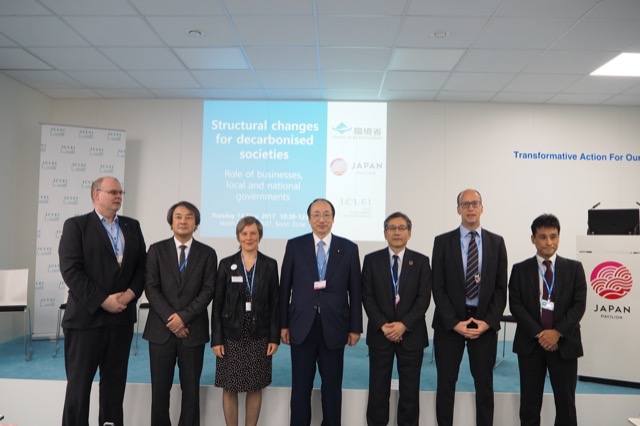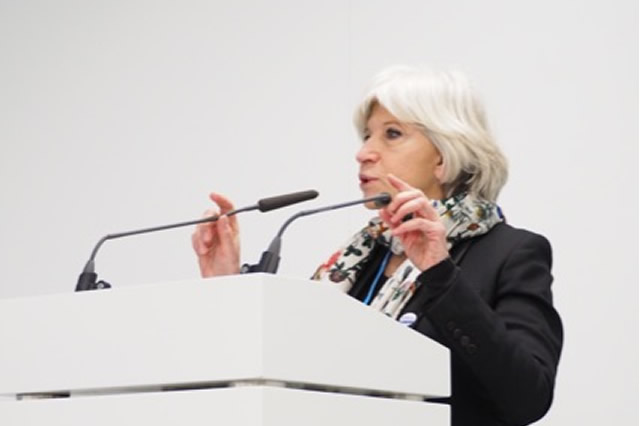
10:30 - 12:00
| Event title | Structural changes for decarbonised societies - Role of business, local, and national governments |
|---|---|
| Contents | Existing technologies and systems are not enough to make the transition towards a decarbonised society envisioned in the Paris Agreement. In fact, the key lies in how to address highly difficult challenges such as restructuring economic and social systems, in addition to facilitating technological innovation. In countries and regions that have made decisions to shift towards decarbonisation, many businesses and local governments are confronting this challenge of making drastic structural changes, while revitalising the economy and enhancing competitiveness. Not only is the central government involved, but also local governments that are implementing strong initiatives, in addition to businesses taking dynamic actions to make headway in achieving a decarbonised society. In this session, leading local governments and businesses from Japan and Germany will share their experiences in implementing actions and restructuring business portfolios that look ahead into the transition towards a decarbonized society. Discussions will also focus on how these local governments and businesses are tackling even challenging areas of decarbonisation, how they are turning those efforts into the community’s sustainability and company’s competitiveness, and the role that each stakeholder plays, including national governments. |
| Keywords | Long-term visions, long-term strategies, structural changes, paradigm shift, transition, non-state actors, decarbonized societies |
| Speakers Name and Title |
|
| Organiser / Co-organiser |
|
Opening remarks (5 min):
Keynote speech 1 (7 min):
“The role of long-term strategies”
Keynote speech 2 (7 min):
“Japan’s Long-term Low-carbon Vision”
Presentations & Panel discussion (25 min + 40 min):
Moderator:
Experiences from the State of North Rhine-Westphalia
Solutions to advance towards net GHG neutrality
FutureCity Yokohama
Customizable Mass-production of Net-zero energy houses
Mr. Yasuo Takahashi, Vice-Minister for Global Environmental Affairs, MOEJ joined the panel for the discussion in addition to the above panelists.
Closing by the Moderator (5 min)
The session began with opening remarks by the Japanese Minister of the Environment Mr. Masaharu Nakagawa. He highlighted that non-state actors, including cities and industries, must cooperate to aim for net zero emissions. Further, the Ministry of the Environment, Japan (MOEJ) launched the Climate Change Initiative 2017 to promote innovative solutions, contributing to deep emission cuts in Japan.
The session was followed by keynote speeches from Ms. Laurence Tubiana and Mr. Yasuo Takahashi. Ms. Tubiana emphasized the importance of developing long-term strategies in order for national governments to become agents of change towards achieving deep decarbonization. She highlighted that Japan was one of the first countries to sign on to the 2050 pathways platform. Then, Mr. Takahashi gave an overview of Japan’s “Long-term Low-carbon Vision,” noting that climate change policies should solve economic and social problems simultaneously.
The panel presentations and discussion included one representative each from Japanese and German local governments and industries, who shared their organizations’ visions and actions towards a decarbonized society.
Mr. Michael Theben shared the State of North Rhine-Westphalia’s vision and goals in switching from a fossil-fuel based industrial economy to one that is based on renewable energy. As a state that hosts various industries relying on fossil fuels, the challenge, he commented that we need to go beyond individual discussions on electrification of industrial processes or energy saving and find a way to promote emission reductions through cooperation across sectors. He concluded that regional governments could play such role.
In his presentation, Mr. Hans-Jörn Weddige made a clear distinction between “carbon neutrality” and “GHG neutrality.” CO2 emission reduction efforts are perceived to be expensive and is not well received among energy-intensive industries, but through the Carbon2Chem project, thyssenkrupp aims to avoid CO2 emissions by using those emitted through the steel production process as raw material for chemical production.
From Japan, Mr. Noriaki Okura shared the City of Yokohama’s climate actions. Yokohama, the second largest city after Tokyo is implementing a city action plan that includes installing battery banks in schools to serve as virtual power plants. The city has also begun to integrate MIRAI hydrogen cars into their fleet and has plans to build more hydrogen stations while pushing hydrogen fueled cars onto the market.
Mr. Tetsuo Iku presented Sekisui House Ltd.’s efforts to place environmental concerns at the center of their business, aiming to neutralize home energy use with energy generation and energy saving technologies.
After the presentations, a panel discussion was held with the additional participation of Mr. Takahashi (MOEJ). The discussion addressed what the main arguments are for why decarbonization makes sense for economic development; what it means to be a leading figure; and the state of and potentials for cooperation between local and national governments.
Takashi Otsuka, Director, Japan Office, ICLEI – Local Governments for Sustainability


Copyright Ministry of the Environment Government of Japan. All rights reserved